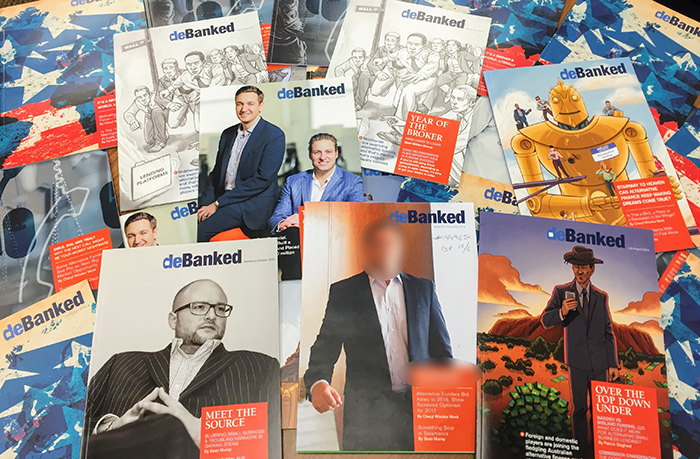Marketplace Lending
Online Consumer Lender Argon Credit Files Chapter 11
December 20, 2016“Decisioning as a Service (DaaS), specifically the commercialization of Argon’s machine learning algorithms, is being developed to revolutionize the way credit is evaluated for the entire industry.” That’s according to a press release put out by Chicago-based Argon Credit 19 months ago. The company filed for bankruptcy on Friday, December 16th.
Argon offered loans from $2,000 to $35,000 with APRs ranging from 4.99% to 149% to consumers with at least a 540 FICO score.
Listing more than $42 million in outstanding debt, the largest creditor by far is the Princeton Alternative Fund, which provides credit facilities to select, consumer-facing lenders in the alternative lending marketplace, according to a fact sheet. Argon owes Princeton and a related entity $39 million, the bankruptcy petition states.
The company filed for Chapter 11 after “experiencing financial difficulty.”
A Q4 To Remember – A Timeline
December 18, 2016In case you haven’t noticed, it’s been an interesting few months for alternative finance. The below timeline is an expanded version of what appears in the print version of our Nov/Dec magazine issue.
9/27 Able Lending secured $100 million in debt financing
9/30 The FTC won a judgement of $1.3 billion against payday loan kingpin Scott Tucker, its largest ever award through litigation
10/11 The United States Court of Appeals for The District of Columbia ruled the CFPB’s organizational structure unconstitutional. To remedy, the agency will either have to convert its one-person directorship to a multi-member commission or the director will have to report to the President of the United States. The CFPB is appealing the decision.
10/13 Affirm secured $100 million in debt financing
10/14
- CircleBack Lending was reported to have ceased lending operations
- Goldman Sachs unveiled its new online consumer lending division, Marcus
10/20 CommonBond secured a $168 million securitization deal
10/24 Bizfi announced that John Donovan had joined the company as CEO. Donovan was the COO of Lending Club from 2007 to 2012.
10/25
- Expansion Capital Group announced new management team. Vincent Ney, the company’s majority shareholder became the CEO
- Lendio raised $20 million through a new equity round led by Comcast Ventures and Stereo Capital
- Lending Club announced its foray into the $1 trillion auto refinancing market
11/1
- Cross River Bank raised $28 million in equity led by Boston-based investment firm Battery Ventures along with Silicon Valley venture capital firms Andreessen Horowitz and Ribbit Capital
- Square beat earnings estimates and extended $208 million through 35,000 loans in Q3
11/3
- OnDeck announced earnings, continued use of balance sheet to fund loans and extended $613 million in Q3
- Independent merchant cash advance training course goes live, allowing brokers and underwriters to earn a certificate
11/4 SEC concluded its investigation into Lending Club
11/7 Lending Club announced earnings and a deal to sell $1.3 billion worth of loans to a National Bank of Canada subsidiary
11/8 CFG Merchant Solutions secured a $4 million revolving line of credit
11/9 Donald Trump became the President-Elect
11/11
- Fintech leader Peter Thiel joins the executive committee of Trump’s transition team
- Kabbage appointed Amala Duggirala as Chief Technology Officer and Rama Rao as Chief Data Officer
11/14 Prosper’s CEO Aaron Vermut, stepped down
11/16
- UK-based p2p lender Zopa applied for a banking license
- Small business lender Dealstruck reportedly ceases lending operations
- Former Lending Club CEO revealed to be launching a new rival, Credify
11/17
- LiftForward secured a $100 million credit facility
- Prosper filed their Q3 10-Q, revealing that they only originated $311.8 million in loans for the quarter compared to $445 million in Q2
- The IRS sent a broad request to Coinbase, the nation’s largest bitcoin exchange, as part of a hunt for tax evaders
- PeerStreet raised a $15 million Series A funding round led by Andreessen Horowitz
11/18 P2Bi raised $7.7 million in venture financing
11/22 LendIt announced the first ever industry awards event
11/29 Three C-level executives at CAN Capital are placed on a leave of absence after the company identified assets that were not performing as expected
12/2
- Total Merchant Resources secures $20 million in private equity, launches wholesale funding division
- Bitcoin-based P2P lending platform BitLendingClub shuts down
- OCC announces they are moving forward with a special purpose national charter for fintech companies
12/8 Former CEO and co-founder of World Wrestling Entertainment tapped to run Small Business Administration
12/9 OnDeck announced new $200 million revolving credit facility with Credit Suisse
12/12 Knight Capital Funding announced new Chief Data Scientist
12/13 Fifth Third Bank is reported to buy a stake in franchise marketplace lender ApplePie Capital
12/14 BlueVine raised $49 million in Series D funding
12/15
- Swift Capital named Tim Naughton as Chief Legal Officer
- John MacIlwaine, Lending Club’s Chief Technology officer, submitted his resignation to the company to pursue another opportunity
12/16 CAN Capital is reported to have laid off more than 100 employees
Fifth Third Bank/ApplePie Capital Deal Great, But Bank Deals For Many Other Business Lenders Still a Pie in the Sky
December 13, 2016 Fifth Third Bank is buying a stake in franchise marketplace lender ApplePie Capital as part of a $16.5 million venture round, the WSJ reported. The prediction that non-banks are evolving into banks is slowly coming true, but will the trend in the commercial space continue?
Fifth Third Bank is buying a stake in franchise marketplace lender ApplePie Capital as part of a $16.5 million venture round, the WSJ reported. The prediction that non-banks are evolving into banks is slowly coming true, but will the trend in the commercial space continue?
Consider that ApplePie has only made 120 loans over the last two years, a small piece of pie compared to a company like CAN Capital which has made nearly 200,000 loans and advances since inception. But ApplePie and CAN are not competitors, nor is ApplePie really like the rest of the industry that has long proclaimed that banks can’t profitably make small business loans under $250,000 or lend to borrowers with poor credit history. Instead, ApplePie’s model, terms and customers have always had a common synergy with banks, $420k loans (on average) for up to 7 years to franchise owners at 8.62% APR (on average) and 750 FICO (on average). It’s a borrower profile that has literally resulted in zero defaults for ApplePie so far, though it’s still early days. Business owners can get term-sheets in 5 days and funding in approximately 30 days. Sounds mighty bankish to me.
ApplePie’s loans are even issued by a New Jersey State chartered commercial bank, Cross River Bank. But ApplePie is the platform, using technology to draw attention to franchise owners in need of financing, streamlining the process and providing a way for investors to participate in the deals. Denise Thomas, the company’s CEO and co-founder told the WSJ that banks’ costs are now too high to make $420,000 loans. That might be true but one wonders if such loans should be done over such a long period of time and at such low rates, especially considering that their borrowers are not asked to put up any personal collateral.
Another lender that tried their hand at prime small business borrowers closed their doors last month. In an op-ed penned by Candace Klein of the now defunct Dealstruck, she said of moving away from the mid-prime borrower to prime, “yields began to tighten. Lenders stopped making a profit and backend capital began to question whether there was a ‘there’ there after all.”
But whereas Dealstruck was constrained by their cost of capital, a bank could potentially make it work. One pitfall that ApplePie has however is limited time in business. It’s easy to claim no defaults on loans with 70 month terms (on average) when you have only been business for two years. Even still, it’s not hard to see why a bank would be interested in their particular model. The vast majority of non-bank small business funding companies operate in a totally different universe, with smaller loans, poorer credit, shorter terms and faster service. These are the ones typically associated with fintech, seeing as they have been able to make tens of thousands or hundreds of thousands of loans in a short amount of time. If that market was as easy as pie though, banks probably would’ve forged more partnerships by now.
Alternative Funders Bid Adieu to 2016, Show Renewed Optimism for 2017
December 12, 2016
After getting pummeled in 2016, many alternative funders have licked their wounds and are flexing their muscles to go another round in 2017.
“The industry didn’t implode or go away after some fairly negative headlines earlier in the year,” says Bill Ullman, chief commercial officer of Orchard Platform, a New York-based provider of technology and data to the online lending industry. “While there were definitely some industry and company-specific challenges in the first half of the year, I believe the online lending industry as a whole is wiser and stronger as a result,” he says.
Certainly, 2016 saw a slowdown in the rapid rate of growth of online lenders. The year began with slight upticks in delinquency rates at some of the larger consumer originators. This was followed by the highly publicized Lending Club scandal over questionable lending practices and the ouster of its CEO. Consumers got spooked as share prices of industry bellwethers tumbled and institutional investors such as VCs, private equity firms and hedge funds curbed their enthusiasm. Originations slowed and job cuts at several prominent firms followed.
Despite the turmoil, most players managed to stay afloat, with limited exceptions, and brighter times seemed on the horizon toward the end of 2016. Institutional investors began to dip their toes back into the market with a handful of publicly announced capital-raising ventures. Loan volumes also began to tick up, giving rise to renewed optimism for 2017.
Notably, in the year ahead, market watchers say they anticipate modest growth, a shift in business models, consolidation, possible regulation and additional consumer-focused initiatives, among other things.
MARKETPLACE LENDERS REDEFINING THEMSELVES
Several industry participants expect to see marketplace lenders continue to refocus after a particularly rough 2016. Some had gone into other businesses, geographies and products that they thought would be profitable but didn’t turn out as expected. They got overextended and began getting back to their core in 2016. Others realized, the hard way, that having only one source of funding was a recipe for disaster.
“Business models are going to evolve quite substantially,” says Sam Graziano, chief executive officer and co-founder of Fundation Group, a New York-based company that makes online business loans through banks and other partners.
For instance, he predicts that marketplace lenders will move toward using their balance sheet or some kind of permanent capital to fund their loan originations. “I think that there will be a lot fewer pure play marketplace lenders,” he says.
Indeed, some marketplace lenders are starting to take note that it’s a bad idea to rely on a single source of financing and are shifting course. Some companies have set up 1940-Act funds for an ongoing capital source. Others have considered taking assets on balance sheet or securitizing assets.
“The trend will accelerate in 2017 as platforms and investors realize that it’s absolutely necessary for long-term viability,” says Glenn Goldman, chief executive of Credibly, an online lender that caters to small-and medium-sized businesses and is based in Troy, Michigan and New York.
BJ Lackland, chief executive of Lighter Capital, a Seattle-based alternative lender that provides revenue-based start-up funding for tech companies, believes that more online lenders will start to specialize in 2017. This will allow them to better understand and serve their customers, and it means they won’t have to rely so heavily on speed and volume—a combination that can lead to shady deals. “I don’t think that the big generalist online lenders will go away, just like payday lending is not going to go away. There’s still going to be a need, therefore there will be providers. But I think we’ll see the rise of online lending 2.0,” he says.
Despite the hiccups in 2016, Peter Renton, an avid P2P investor who founded Lend Academy to teach others about the sector, says he is expecting to see steady and predictable growth patterns from the major players in 2017. It won’t be the triple-digit growth of years past, but he predicts investors will set aside their concerns from 2016 and re-enter the market with renewed vigor. “I think 2017 we’ll go back to seeing more sustainable growth,” he says.
THE CONSOLIDATION EQUATION
Ron Suber, president of Prosper Marketplace, a privately held online lender in San Francisco, says victory will go to the platforms that were able to pivot in 2016 and make hard decisions about their businesses.
Prosper, for example, had a challenging year and has now started to refocus on hiring and growth in core areas. This rebound comes after the company said in May that it was trimming about a third of its workforce, and in October it closed down its secondary market for retail investors. Suber says business started to pick up again after a low point in July. “Business has grown in each of the subsequent months, so we are back to focused growth and quality loan production,” he says.
Not long after he said this, Prosper’s CEO, Aaron Vermut, stepped down. His father, Stephan Vermut, also relinquished his executive chairman post, a sign that attempts to recover have come at a cost.
Other platforms, meanwhile, that haven’t made necessary adjustments are likely to find that they don’t have enough equity and debt capital to support themselves, industry watchers say. This could lead to more firms consolidating or going out of business.
 The industry has already seen some evidence of trouble brewing. For instance, online marketplace lender Vouch, a three-year-old company, said in June that it was permanently shuttering operations. In October, CircleBack Lending, a marketplace lending platform, disclosed that they were no longer originating loans and would transfer existing loans to another company if they couldn’t promptly find funding. And just before this story went to print, Peerform announced that they had been acquired by Versara Lending, a sign that consolidation in the industry has come.
The industry has already seen some evidence of trouble brewing. For instance, online marketplace lender Vouch, a three-year-old company, said in June that it was permanently shuttering operations. In October, CircleBack Lending, a marketplace lending platform, disclosed that they were no longer originating loans and would transfer existing loans to another company if they couldn’t promptly find funding. And just before this story went to print, Peerform announced that they had been acquired by Versara Lending, a sign that consolidation in the industry has come.
“I think you will see the real start of consolidation in the space in 2017,” says Stephen Sheinbaum, founder of New York-based Bizfi, an online marketplace. While some deals will be able to breathe life into troubled companies, others will merge to produce stronger, more nimble industry players, he says. “With good operations, one plus one should at least equal three because of the benefits of the economies of scale,” he says.
Market participants will also be paying close attention in 2017 to new online lending entrants such as Goldman Sachs’ with its lending platform Marcus. Ullman of Orchard Platform says he also expects to see more partnerships and licensing deals. “For smaller, regional and community banks and credit unions—organizations that tend not to have large IT or development budgets—these kinds of arrangements can make a lot of sense,” he says.
A BLEAKER MCA OUTLOOK
Meanwhile, MCA funders are ripe for a pullback, industry participants say. MCA companies are now a dime a dozen, according to industry veteran Chad Otar, managing partner of Excel Capital Management in New York, who believes new entrants won’t be able to make as much money as they think they will.
Paul A. Rianda, whose Irvine, California-based law firm focuses on MCA companies, likens the situation to the Internet boom and subsequent bust. “There’s a lot of money flying around and fin-tech is the hot thing this time around. Sooner or later it always ends.”
In particular, Rianda is concerned about rising levels of stacking in the industry. According to TransUnion data, stacked loans are four times more likely to be the result of fraudulent activity. Moreover, a 2015 study of fintech lenders found that stacked loans represented $39 million of $497 million in charge-offs.
Although Rianda does not see the situation having far-reaching implications as say the Internet bubble or the mortgage crisis, he does predict a gradual drop off in business among MCA players and a wave of consolidation for these companies.
“I do not believe that the current state of some MCA companies taking stacked positions where there are multiple cash advances on a single merchant is sustainable. Sooner or later the losses will catch up with them,” he says.
Rianda also predicts that the decrease of outside funding to related industries could have a spillover effect on MCA companies, causing some to cut back operations or go out of business. “Some companies have already seen decreased funding in the lending space and subsequent lay off of employees that likely will also occur in the merchant cash advance industry,” he says.
THE REGULATORY QUESTION MARK
One major unknown for the broader funding industry is what regulation will come down the pike and from which entity. The Office of the Comptroller of the Currency that regulates and supervises banks has raised the issue of fintech companies possibly getting a limited purpose charter for non-banks. The OCC also recently announced plans to set up a dedicated “fintech innovation office” early in 2017, with branches in New York, San Francisco and Washington.
There’s also a question of the CFPB’s future role in the alternative funding space. Some industry participants expect the regulator to continue bringing enforcement actions against companies. In September, for instance, it ordered San Francisco-based LendUp to pay $3.63 million for failing to deliver the promised benefits of its loan products. Ullman of Orchard Platform says he expects the agency to continue to play a role in the future of online lending, particularly for lenders targeting sub-prime borrowers.
Meanwhile, some states like California and New York are focusing more efforts on reining in online small business lenders, and it remains to be seen where this trend takes us in 2017.
MORE CONSUMER-FOCUSED INITIATIVES ON HORIZON
As the question of increased regulation looms, some industry watchers expect to see more industry led consumer-focused initiatives, an effort which gained momentum in 2016. A prime example of this is the agreement between OnDeck Capital Inc., Kabbage Inc. and CAN Capital Inc. on a new disclosure box that will display a small-business loan’s pricing in terms of total cost of capital, annual percentage rates, average monthly payment and other metrics. The initiative marked the first collaborative effort of the Innovative Lending Platform Association, a trade group the three firms formed to increase the transparency of the online lending process for small business owners.
Katherine C. Fisher, a partner with Hudson Cook LLP, a law firm based in Hanover, Maryland, that focuses on alternative funding, predicts that more financers will focus on transparency in 2017 for competitive and anticipated regulatory reasons. Particularly with MCA, many merchants don’t understand what it means, yet they are still interested in the product, resulting in a great deal of confusion. Clearing this up will benefit merchants and the providers themselves, Fisher notes. “It can be a competitive advantage to do a better job explaining what the product is,” she says.
 CAPITAL-RAISING WILL CONTINUE TO POSE CHALLENGES
CAPITAL-RAISING WILL CONTINUE TO POSE CHALLENGES
Although there have been notable examples of funders getting the financing they need to operate and expand, it’s decidedly harder than it once was. Renton of Lend Academy says that some institutional investors will remain hesitant to fund the industry, given its recent troubles. “It’s a valuation story. While valuations were increasing, it was relatively easy to get funding,” he says. However, industry bellwethers Lending Club and OnDeck are both down dramatically from their highs and concerns about their long-term viability remain.
“Until you get sustained increases in the valuation of those two companies, I think it’s going to be hard for others to raise money,” Renton says.
Several years ago, alternative funders were new to the game and gained a lot of traction, but it remains to be seen whether they can continue to grow profits amid greater competition and the high cost of obtaining capital to fund receivables, according to William Keenan, chief executive of Pango Financial LLC, an alternative funding company for entrepreneurs and small businesses in Wilmington, Delaware.
These companies continue to need investors or retained earnings and for some companies this is going to be increasingly difficult. “How they sustain growth going forward could be a challenge,” he says. Even so, Renton remains bullish on the industry—P2P players especially. “The industry’s confidence has been shaken. There have been a lot of challenges this year. I think many people in the industry are going to be glad to put 2016 to bed and will look with renewed optimism on 2017,” he says.
Prior to this story going to print, small business lender Dealstruck was reportedly not funding new loans and CAN Capital announced that three of the company’s most senior executives had stepped down.
New deBanked Magazine Issue is On The Way
December 7, 2016
The Nov/Dec issue of deBanked magazine is on the way! Can you guess who is on the cover? Hint: his face is blurred out in this image so you can’t cheat!
This edition closes the end of 2016, celebrates the journey of an industry veteran, recaps late fall conferences, and reveals new clues and details into a former industry player’s devilish fall from grace.
Stay on top of the industry and finish out the year with our latest major stories that are released in print well before they’re online. If you’re not already subscribed to deBanked Magazine, register now for FREE!
Is Marketplace Lending Really Just Westworld?
December 5, 2016
If you haven’t watched HBO’s new flagship TV show Westworld, my analogy may have some broad spoilers so you might want to look away. Also, you should start watching the show.
In a world controlled by banks, people can visit a world where the hosts looks like banks but aren’t. They’re non-banks with bank-like attributes run off of advanced programming. You can borrow from them, pay them back, invest in them and securitize their loans. They seem real indeed, but the real banks are the chartered ones that pull their strings and script their stories.
In this real life version of Westworld, might the proposed OCC charter be the maze?
A rose is a rose is a rose.
Goldman Sachs Goes After Online Lenders With Video Ads
November 25, 2016“No fees. Ever,” states one of Marcus’ new video ads. Marcus is Goldman Sachs’ new online consumer lending division and the value proposition is pretty compelling. Most other online lenders for example, strongly rely on origination fees, but Marcus doesn’t charge them nor any other kind of fee. View their four campaign videos below:
Don’t Write Off Marketplace Lending Just Yet; Silicon Valley Just Made a Big Bet
November 18, 2016
Don’t lose all hope on marketplace lending yet. Silicon Valley just made a big bet on one startup.
Silicon Valley’s leading venture capital firm Andreessen Horowitz invested $15 million in PeerStreet, a marketplace for secured real estate loans. PeerStreet was founded in 2013, by former Google employee Brett Crosby and former real estate attorney Brew Johnson, who oversaw the sale of travel website VirtualTourist to Expedia/TripAdvisor for $85 million. The Manhattan Beach, CA-based company’s crowdfunding platform offers investors secured real estate loans that it sources from local real estate lenders across the country.
“This round of funding will help us further execute on our goal of building a world class investment platform for real estate debt,” said co-founder and CEO Brew Johnson.
To date, it has funded over $165 million in loan investments with $50 million in returns to investors and has 50 lenders on the platform. The company has secured funding from marquee Silicon Valley investors including Michael Burry of The Big Short fame who predicted the 2008 subprime crisis and Adam Nash, former CEO of Wealthfront. Alex Rampell, general partner at Andreessen Horowitz and co-founder of consumer lending Affirm Inc led the investment and will take a seat on PeerStreet’s board.
“They (PeerStreet) have a unique distribution model that allows them to leverage existing lending networks to lower loss rates, and grow without direct marketing,” said Rampell in a statement.





























